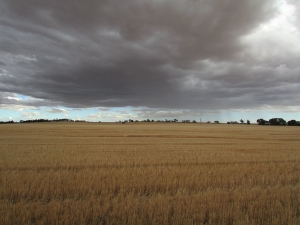Better use of seasonal forecasting: adviser input sought
Better use of seasonal forecasting: adviser input sought
Date: 15 Oct 2020

Year to year climate variability is a major source of risk to grain grower profitability in the southern cropping region.
It is a fact well recognised by the Grains Research and Development Corporation (GRDC) which is responding to the challenge through targeted investments which aim to improve the way growers and others in the grains industry use seasonal climate forecasts.
“Many growers and their advisers are aware of seasonal climate forecasts but are unsure how to best use the information in decision making,” says GRDC Grower Relations Manager – South, Randall Wilksch.
“We want to address this by encouraging the most effective use of the latest climate information to improve profit and risk management for our grain growers,” he says.
Mr Wilksch says the GRDC’s ‘Using seasonal forecast information and tools to manage risk and increase profitability’ investment is looking at a number of ways to support growers and their advisers.
One of those activities is a pilot program to up-skill a small group of advisers to identify, test and develop a framework to use seasonal forecast information to better manage risk and increase growers’ enduring profitability.
As part of the program, a second series of online workshops involving 20 agronomists from South Australia, Victoria, Tasmania and southern New South Wales will be held in late November. The first series of workshops was well received by the participating advisers, many of whom commented that more effective use of seasonal forecasts was important in underpinning grower decision making.
The workshops will be led by Peter Hayman from the South Australian Research and Development Institute (SARDI), which is the research division of the SA Department of Primary Industries and Regions, along with SA consultant and grower Barry Mudge and Mark Stanley from Regional Connections.
The workshops will investigate where seasonal climate forecasts can be best incorporated into a grower’s farming system.
Mr Wilksch says advisers who agree to participate in the program will be asked to complete a series of tasks prior to, during and after the workshops.
“Participants will be more than passive observers – they will provide critical feedback for the development of a climate analysis tool as well as assess the relevance of other climate information presented in the workshops.”
During the workshops, a Bureau of Meteorology (BoM) representative will present on skill and confidence levels in BoM forecasts. An update on climate drivers will be provided by Agriculture Victoria’s Dale Grey, while Graeme Anderson, also from Agriculture Victoria, will give an overview of resources produced to date from the ‘Using seasonal forecast information and tools to manage risk and increase profitability’ investment, which he leads in conjunction with Mr Grey.
The program is open to any agronomist with a minimum client base of 10 grain growers.
Expressions of interest in being involved close on Friday, October 30. The online workshops will be held over the last two weeks of November this year. More information is available from Mark Stanley via 0427 831151 or mark@regionalconnections.com.au.
Resources generated out of the ‘Using seasonal forecast information and tools to manage risk and increase profitability’ investment can be found at www.forecasts4profit.com.au, while guidance on interpreting weather forecasts is contained in a GRDC Paddock Practices.
Meanwhile, work is well under way through another GRDC investment – AgScore – which will provide robust comparisons of seasonal climate forecasts (SCFs) from a range of models operated by various institutions across the globe.
It will assess the accuracy of SCFs using agriculturally relevant metrics to help growers use SCFs to manage climate risk and make profitable decisions.
Through a series of case studies with growers and other producers, the project will also assess the economic value of SCFs in aiding key on-farm decisions such as crop type prior to sowing.
AgScore is being led by the CSIRO which is partnering with commercial business, Weather Intelligence, which provides climate analytics services and research to support the mining, energy and agricultural industries in Australia.
The project, which involves co-investment by the cross-research and development corporation Managing Climate Variability program, started in July this year and will conclude in December next year.
Contact details
For interviews
Randall Wilksch, GRDC Grower Relations Manager
0437 769 098
Contact
GRDC Adelaide office Communications Manager – South
(08) 8198 8400
media@grdc.com.au
GRDC Project Code: DAV1803-010SAX, CSP2004-007RTX,
